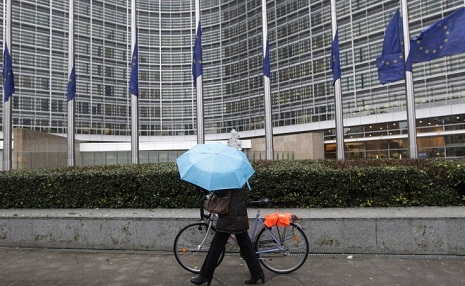"I`m convening an extraordinary Foreign Affairs Council next Thursday on the situation in Ukraine," Mogherini said on her Twitter account on Sunday.
In a joint statement, the EU`s heads of state and government then voiced concern about the deteriorating security and humanitarian situation in Ukraine, asking the Council of Foreign Ministers to consider new restrictive measures against Russia.
"In view of the worsening situation we ask (foreign ministers) to assess the situation (in Ukraine) and to consider any appropriate action, in particular on further restrictive measures (against Russia), aiming at a swift and comprehensive implementation of the Minsk agreements," they said.
Possible extension of anti-Russian sanctions
According to a draft statement, prepared for Thursday’s meeting and seen by Reuters news agency, the ministers were going to decide on extension of anti-Russia sanctions, though it did not specify the timeline.
"In view of the worsening situation, the Council (of Foreign Ministers) agrees to extend the restrictive measures targeting persons and entities for threatening or undermining Ukraine`s sovereignty and territorial integrity ... until September 2015," Reuters cited the draft conclusions.
The ministers are also expected to ask the EU`s executive Commission and its diplomatic service to draw up a list of further names that could be put under sanctions, for a decision within a week, the document said. They will ask officials to carry out more work "on any appropriate action, in particular on further restrictive measures, aiming at ensuring a swift and comprehensive implementation" of a truce deal signed last September in Minsk.
A final decision on further economic sanctions on Russia is likely to be left to EU leaders, who will meet on February 12. This information has been also confirmed by a European source close to the Council, who told TASS: "The foreign ministers will most likely request the European Commission to prepare new restrictive measures for an EU summit on February 12. And leaders of the union’s countries will make a decision, although it is also possible that it will last until March (before a final decision is made)."
"Everything will depend on situation on the ground (in Ukraine’s south-east)," the diplomat added.
Situation in Ukraine`s south-east
The situation in eastern Ukraine — and particularly on the territory of the much-troubled war-torn Donetsk region — aggravated sharply at the beginning of last week following several months of a relative lull when the pro-Kiev military forces launched an operation around what is left of the former Donetsk international airport.
Simultaneously with combat actions in the area adjoining the airport, Ukrainian pro-government forces started artillery shelling of the urban districts in Donetsk, which until very recently were home to almost a million people.
On Saturday, January 24, an amassed artillery strike was delivered at a residential area in the south-eastern city of Mariupol on the Sea of Azov. It took away the lives of thirty peaceful civilians and left almost a hundred people wounded.
Monitors from the Organization for Security and Cooperation in Europe (OSCE) who visited the site of shelling said fire had most apparently been delivered from Grad and Uragan multiple rocket launchers from the east and/or north-east.
Russian Foreign Minister Sergey Lavrov, who had a telephone conversation with Mogherini on Sunday, stressed the importance of an unbiased investigation of the recent artillery strikes at Donetsk and Mariupol with the closest possible engagement on the part of the OSCE.
As they discussed further developments in Ukraine, Lavrov reaffirmed Russia’s assessment of the situation as a straightforward result of Kiev’s line at avoiding direct dialogue with leaders of the self-proclaimed Donetsk and Luhansk People’s Republics on practical implementation of the September Minsk ceasefire accords and at suppressing insurrection in the country’s south-east by force.
More about:
















































